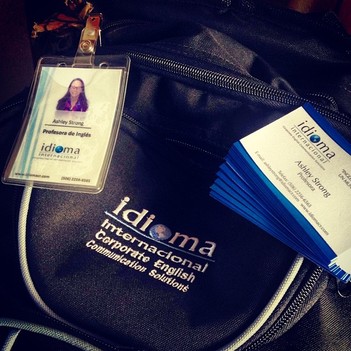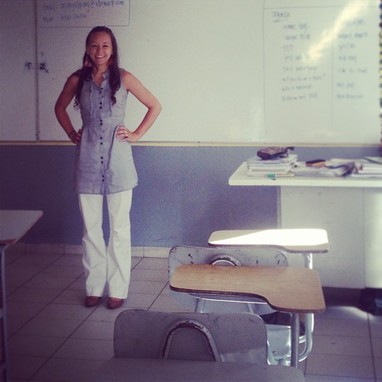|
What sparked your interest in going to teach English abroad? Throughout College, I always knew I wanted to teach in another country. It was and has been extremely important to me to be a part of and give back to different communities around the world. Upon college graduation, I started a full time job working for the Los Angeles PBS station. After years of working full time, I kept thinking about teaching abroad, specifically in Africa. Several months of research later, an extensive application to WorldTeach and before I knew it, I was accepted to teach English in Tanzania, Africa more specifically on Mafia Island (off the coast of Tanzania). After spending three months teaching on Mafia Island, I fell in love with teaching abroad and being a part of a community outside of my own. Immediately upon returning to the United States, I signed up with the International TEFL Academy to receive my certification! Here I am, now teaching in San Jose, Costa Rica.  Why did you decide to get TEFL certified and choose International TEFL Academy?
I decided to get TEFL certified while teaching abroad on Mafia Island, Tanzania. While teaching and living there, I tapped into a new part of me that I had yet to discover. Everyday I woke up so inspired and ready to inspire. After doing research on the various TEFL certification courses, I fell in love with International TEFL Academy due to their impeccable communication, thoroughness in information, incredibly friendly staff and the amount of online classes offered. **Mention my name when registering for International TEFL Academy and receive a $50 discount on your TEFL course. Use coupon code AlumniReferral50** How did you like the course? I took the online course and completed my practicum hours at a local community college in Oceanside, CA. My instructor was so amazing. She gave quick, honest feedback and had suggestions/ comments for every assignment. As part of the course requirements, we had weekly forums that enabled us to communicate with and discuss various items with other classmates around the world. The tasks were all extremely helpful and effectively prepared me to create my own lesson plans. The practicum hours were some of my favorite moments of the course. It enabled me to sit in a classroom on a regular basis, create my own lesson plans, observe, student teach and be an extra set of hands in the classroom. It also gave me the opportunity to see what TEFL courses look like in my own country! How has your TEFL training helped you in your current teaching position? My TEFL training helped me with my current position in a number of ways. Firstly, it taught me how to create effective lesson plans. Secondly, gave me the opportunity to put those lesson plans into practice in an actual classroom. Finally, if it wasn't for my TEFL certification and the incredible help of the International TEFL Academy staff, I wouldn't have known where to start with looking for a teaching job abroad. I was provided with so many tools, setting me up for complete success!  How did you secure your English teaching job?
Two months prior to the peak hiring season in Costa Rica, I sent emails to my top choice schools that included my resume, cover letter, my availability for an in-person interview, my skype availability and two letters of recommendation. What school, company, or program are you working for? I am currently working for Idioma Internacional in San Jose, Costa Rica. How did you get your work visa? I am working in the country without a work visa. Every 90 days I have to leave the country for 72 hours. With this, I am legally able to work as long as my visa status is current and I register for a tax id number and pay taxes. I am fortunate in that the company I work for handles a lot of the logistics for this process, but it is my responsibility to keep my passport status up the date. Tell us about your English teaching job! · My title is Profesora de Ingles. · Training lasted two weeks, which included grammar, jams, company logistics, policies and procedures, lesson planning, observing class, etc. · After training I received a schedule teaching 8 classes a week at around 22 hours. · I receive $8 an hour for regular classes, $10 for one-on-one classes and $10 for our high school courses. · At this point, I am not able to save as I've been without a paycheck for quite some time with the transition abroad. · Here, people typically just make enough to cover expenses with little room to save. · I am working for a school that provides "Corporate English Communication Solutions." · Teachers at Idioma travel to corporate clients around the San Jose area providing six different levels of English instruction to groups of anywhere from one to eight students. · In addition, on weekends, I teach a high-school class with around 13 students. · With signing a year contract, I receive 10 un-paid vacation days. How did you find somewhere to live and what is it like? Do you have roommates? I was extremely fortunate with my living situation. One requirement with moving abroad again was to live with a local family, as it was really important for me to see what it's really like to live locally. I expressed this desire to my current employer during the interview process. Upon receiving the job offer, they communicated a couple living options. After a few emails, I was prepared to rent a room out of a local families house. It worked out so well that I was able to come directly from the airport straight to my new home. I live with six people right now - the husband and wife who own the house and three other roommates (two of which are teaching English and one graphic designer). Oh yea, I cannot forget our two incredible dogs! I have my own bedroom and share a common living space, kitchen and bathroom with the other housemates. It's such a beautifully positive and respectful home!  Information about my country, Costa Rica: To start, this country is absolutely BEAUTIFUL! It's filled with so many colors and tropical flowers. There are plants growing out of the concrete, birds chirping outside my window, butterflies colors I couldn't have imagined, smiling faces and extremely fast drivers! Public transportation is great! At least what I've experienced. I can take a bus to pretty much anywhere in Costa Rica. There isn't one central website or bus station, but after asking locals which bus to take where, one can quickly learn how to get around! I'm not much of a nightlife kind of person. I did go out my first Saturday in San Jose to an incredible reggae bar. The music was amazing, the people were so nice and the local beer grew on me quickly. Seeing as I'm living in the city and just a bus ride away from the rest of the country, there is so much to do. During the mornings I go for a run in the local parks. If I have time in-between classes, I skate around. The city has so many statues, monuments, historical buildings and parks to discover. There is always a market to go adventure in or an event happening around the corner. The food is simple, but good. Rice and beans are cheap and easy to cook. I haven't eaten out much as it's so much more expensive than to eat at home. I do splurge on cappuccinos and chocolate croissants at the Saturday organic farmers market. Although my schedule is quite busy with teaching classes and preparing for them, there is still time to travel. Sundays I spend the mornings on a bus to Jaco (the closest beach) or exploring the city and local gardens! How would you describe your standard of living?
Costa Rica is interesting in that Tico's (locals) live on very little money per month (around $400), yet everything but food is really expensive. In your opinion, how much does someone need to earn in order to live comfortably? At 30 hours per week and $8 an hour, it is sufficient for rent, utilities and food with no money left to save. What advice would you give someone planning or considering teaching abroad? Would you recommend teaching in your country? Do you research, do your research and do your research. Connect with people and schools before coming. Have an impeccable resume and cover letter. Save enough money to not have an income for the first couple months of arriving in the country. Pack a few items that really help you feel at home (special fabrics, blankets, etc.). Make sure you have a support system and that you can be away from them physically for a long period of time. Study, learn and practice the local language. Be open, flexible and understanding to change and the unknown. Have confidence in yourself. Stay positive. Be open to asking for and receiving help. Continue to do activities outside of teaching that make you happy. Have fun. Trust. Accept. Utilize your resources. For more information, please check out San Jose, Costa Rica English Teaching Q&A with Ashley Strong on INternational TEFL Academy's website!
0 Comments
Leave a Reply. |
|

